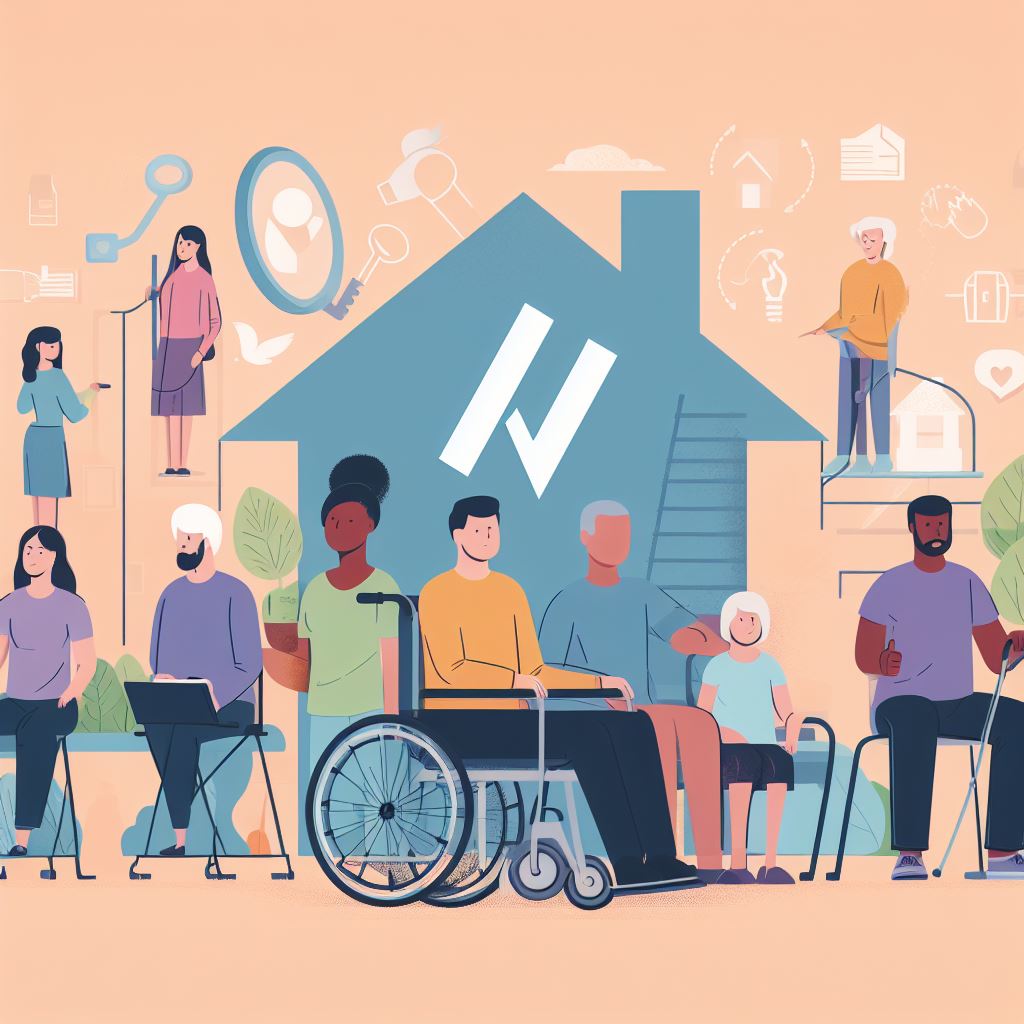12 Key Points: Section 8 Housing Eligibility for Disabled

Did you know that nearly 13% of people with disabilities in the United States rely on Section 8 housing assistance?
Understanding the eligibility requirements is crucial for disabled individuals seeking affordable housing options.
In this article, we will explore the 12 key points you need to know about Section 8 housing eligibility for the disabled.
From income requirements to documentation of disability, we aim to provide you with informative and concise information to navigate this vital program.
Key Takeaways
- Disability for Section 8 housing eligibility is determined by the U.S. Department of Housing and Urban Development (HUD) and includes both visible and invisible disabilities.
- Proper documentation, such as medical records or statements from healthcare professionals, is necessary to verify disability for eligibility.
- Understanding income requirements and meeting both income and disability requirements is essential for Section 8 housing eligibility.
- Disabled individuals under 18 may still be eligible for Section 8 housing if their disability meets the definition set by HUD, and age exceptions may apply.
Definition of Disability
If you’re seeking eligibility for Section 8 housing as a disabled individual, it’s important to understand the specific definition of disability. The definition of disability for Section 8 housing is determined by the U.S. Department of Housing and Urban Development (HUD). According to HUD, a person is considered disabled if they’ve a physical or mental impairment that substantially limits one or more major life activities. Major life activities include tasks such as walking, seeing, hearing, speaking, and performing manual tasks.
It is worth noting that disabilities can vary greatly from person to person. Some disabilities may be obvious, such as using a wheelchair, while others may be invisible, such as mental health conditions or chronic pain. HUD recognizes that disabilities can have different effects on individuals, so the definition of disability is broad and inclusive.
To determine eligibility for Section 8 housing, you’ll need to provide documentation that verifies your disability. This can include medical records, statements from healthcare professionals, or other relevant evidence. It’s important to work closely with your local Public Housing Agency (PHA) to understand their specific requirements and provide the necessary documentation.
Income Eligibility Requirements
When it comes to Section 8 Housing eligibility for disabled individuals, understanding the income requirements is crucial. There are minimum income thresholds that applicants must meet in order to qualify for assistance.
Additionally, disability-specific income considerations may apply, taking into account any additional financial support received due to a disability. Proper documentation and verification of income are essential to determine eligibility and ensure fair distribution of resources.
Minimum Income Thresholds
To qualify for Section 8 housing as a disabled individual, you must meet the minimum income thresholds. These thresholds are determined by the Department of Housing and Urban Development (HUD) and are based on the area median income (AMI) of your local community.
Here are four important things to know about the minimum income thresholds for Section 8 housing:
- The income limits vary by family size: HUD sets different income limits depending on the number of people in your household. The larger your family, the higher the income limit you can qualify for.
- Income calculations include all sources: When determining your eligibility, HUD takes into account all sources of income, including wages, social security benefits, and disability payments.
- Some deductions may be allowed: HUD allows certain deductions to be made from your income, such as medical expenses or childcare costs. These deductions can help lower your overall income and increase your chances of qualifying for Section 8 housing.
- You must meet both the income and disability requirements: In addition to meeting the minimum income thresholds, you must also meet the disability requirements for Section 8 housing. This includes having a qualifying disability as defined by HUD.
Understanding the minimum income thresholds is crucial when applying for Section 8 housing as a disabled individual. However, it’s also important to consider disability-specific income considerations, which will be discussed in the next section.
Disability-Specific Income Considerations
You frequently need to meet specific income eligibility requirements based on your disability when applying for Section 8 housing. These requirements are designed to ensure that the program is accessible to individuals with disabilities who’ve limited financial resources. When determining your eligibility, the housing authority will consider your disability-related expenses and the impact they’ve on your income.
This includes medical expenses, such as doctor’s visits, prescription medications, and therapy costs. Additionally, any income you receive from disability benefits, such as Social Security Disability Insurance (SSDI) or Supplemental Security Income (SSI), will also be taken into account. It’s important to provide documentation of your disability and the associated expenses to support your eligibility.
Understanding and meeting these disability-specific income considerations can help increase your chances of qualifying for Section 8 housing.
Documentation and Verification
To meet the income eligibility requirements for Section 8 housing as a disabled individual, you must provide documentation and verification of your income. Here are the key points to keep in mind:
1) Pay stubs: Submit your most recent pay stubs from all sources of income, including part-time jobs or self-employment.
2) Tax returns: Provide copies of your federal tax returns for the past two years, including all schedules and attachments.
3) Social Security benefits: If you receive Social Security Disability Insurance (SSDI) or Supplemental Security Income (SSI), provide a copy of your award letter or benefit statement.
4) Other sources of income: Include documentation for any additional sources of income, such as pensions, retirement accounts, or child support.
Citizenship or Eligible Immigration Status
In order to be eligible for Section 8 housing, you must possess a valid citizenship or an eligible immigration status. This requirement ensures that the program is available to those who are legally authorized to reside in the United States. To determine your eligibility, you’ll need to provide documentation that proves your citizenship or immigration status.
Accepted documents include a valid U.S. passport, a Certificate of Naturalization, or a Permanent Resident Card. If you’re a non-citizen, you’ll need to provide proof of your eligible immigration status, such as an employment authorization card or a refugee travel document.
It’s important to note that Section 8 housing assistance isn’t available to individuals who are in the country unlawfully. However, if you’re a lawful permanent resident with a disability, you may be eligible for Section 8 housing benefits.
The U.S. Department of Housing and Urban Development (HUD) encourages all individuals with disabilities who meet the citizenship or eligible immigration status requirements to apply for Section 8 housing assistance.
Age Requirements for Disabled Individuals
When it comes to Section 8 housing eligibility for disabled individuals, age requirements play a crucial role. The minimum age requirement for disabled individuals to qualify for Section 8 housing is typically 18 years old. However, there are exceptions for individuals with disabilities who are under 18, as long as they meet certain criteria.
It’s important to provide proper documentation to establish age eligibility for disabled individuals seeking Section 8 housing assistance.
Minimum Age Requirement
You must meet a specific age requirement to be eligible for Section 8 housing as a disabled individual. Here are some important points to keep in mind regarding the minimum age requirement:
- The minimum age requirement for Section 8 housing eligibility varies by jurisdiction. In some areas, the minimum age is 18, while in others it may be higher, such as 62 or 65.
- If you’re under the minimum age requirement, you may still be eligible for other housing programs specifically designed for disabled individuals, so it’s important to explore all available options.
- In certain cases, exceptions may be made for disabled individuals who are under the minimum age requirement. These exceptions are typically based on factors such as the individual’s level of disability and the availability of suitable housing options.
- It’s important to consult with your local housing authority or a housing counselor to determine the specific age requirement in your area and to discuss any potential exceptions or alternative housing programs that may be available to you.
Age Exceptions for Disabilities
To determine if you qualify for Section 8 housing as a disabled individual, it’s important to understand the age exceptions that may apply to you. Generally, individuals must be at least 18 years old to be eligible for Section 8 housing. However, there are certain age exceptions for disabled individuals.
If you’re under 18 and have a disability, you may still be eligible for Section 8 housing. The key factor is whether your disability meets the definition set by the Department of Housing and Urban Development (HUD). HUD considers a person disabled if they have a physical or mental impairment that substantially limits one or more major life activities.
If you meet this definition, you may qualify for Section 8 housing regardless of your age. It’s important to consult with your local housing authority to determine if you meet the eligibility requirements.
Age Eligibility Documentation
If you’re a disabled individual seeking Section 8 housing, it’s important to provide the necessary age eligibility documentation. This documentation helps determine if you meet the age requirements for disabled individuals.
Here are four key points to keep in mind when it comes to age eligibility documentation:
- Age verification: You’ll need to provide a valid form of identification that clearly states your date of birth. This can include a driver’s license, passport, or birth certificate.
- Disability documentation: In addition to age verification, you’ll also need to provide documentation that proves your disability. This can include medical records, a letter from your healthcare provider, or a disability determination letter from the Social Security Administration.
- Income verification: Along with age and disability documentation, you’ll also need to provide proof of your income. This can include pay stubs, tax returns, or a letter from your employer.
- Additional requirements: Depending on your specific situation, there may be additional documentation required. This could include proof of residency, household composition, or citizenship status.
Documentation of Disability
Provide proof of your disability to demonstrate your eligibility for Section 8 Housing.
In order to qualify for Section 8 Housing as a person with a disability, you must provide documentation that verifies your disability status. This documentation can include medical records, letters from healthcare professionals, or disability determination letters from government agencies.
It’s important to ensure that the documentation clearly states the nature of your disability, the limitations it imposes on your daily life, and the duration of the disability. The documentation should also be recent, typically within the past 12 months, to demonstrate that your disability is current and ongoing.
If you have multiple disabilities, it’s essential to provide documentation for each disability. Remember to keep copies of all your documentation for your own records.
Reasonable Accommodation Requests
Submit a written request for reasonable accommodations to ensure accessibility and meet your specific needs in Section 8 Housing.
When applying for Section 8 Housing, it’s important to remember that you have the right to request reasonable accommodations to ensure that your living situation meets your specific needs. Here are some key points to consider when making your written request:
- Clearly state your specific needs: Be specific about the accommodations you require in order to live comfortably and independently. Whether it’s a wheelchair ramp, grab bars in the bathroom, or a designated parking spot, make sure to clearly outline what you need.
- Provide supporting documentation: Include any relevant documentation such as medical records or letters from healthcare professionals that support your need for these accommodations. This will strengthen your case and help the housing authority understand the necessity of your request.
- Be proactive and persistent: Follow up regularly with the housing authority to ensure that your request is being processed and that any necessary actions are being taken. Don’t hesitate to provide additional information or answer any questions they may have.
- Seek legal assistance if needed: If your request for reasonable accommodations is denied or if you face any discrimination during the process, it may be necessary to seek legal assistance. Consult with an attorney who specializes in housing rights for individuals with disabilities to explore your options.
By submitting a written request for reasonable accommodations, you’re taking an important step towards ensuring that your living situation meets your needs.
In the next section, we’ll discuss household size limitations in Section 8 Housing.
Household Size Limitations
When it comes to Section 8 housing eligibility for disabled individuals, there are certain limitations on household size that need to be considered.
However, there are exemptions available for disabled individuals who require larger households due to their disability-related needs.
It’s important to understand these exceptions and exemptions to ensure that disabled individuals have access to the housing they need.
Disabled Exemptions for Limitations
To qualify for disabled exemptions for limitations regarding household size in Section 8 housing, you must meet specific criteria. These exemptions are available for disabled individuals who require additional space due to their disability-related needs.
Here are the key points to understand:
- Medical documentation: You must provide medical documentation from a qualified professional that clearly demonstrates the need for additional space due to your disability.
- Reasonable accommodation request: You must submit a reasonable accommodation request to your housing authority, explaining why you require a larger unit or additional bedrooms.
- Verification of disability: You must provide proof of your disability, such as Social Security Disability Insurance (SSDI) or Supplemental Security Income (SSI) documentation.
- Approval process: Your housing authority will review your request and determine if you meet the necessary qualifications for a disabled exemption. It’s important to follow their guidelines and provide all required documentation to increase your chances of approval.
Exceptions for Larger Households
If you have met the criteria for disabled exemptions for limitations regarding household size, you may be eligible for exceptions for larger households in Section 8 housing.
Generally, Section 8 housing has specific guidelines on the number of bedrooms a household can qualify for based on its size. However, for disabled individuals or families with disabilities, there are exceptions to these limitations.
If you have a larger household due to the presence of a disabled family member or a combination of disabilities, you may be eligible for an exception that allows you to qualify for a larger home. These exceptions are made to accommodate the specific needs of disabled individuals and ensure they have adequate housing.
Criminal Background Checks
Are you wondering how criminal background checks affect your eligibility for Section 8 housing as a disabled individual? It’s an important question, and understanding the impact of your criminal history on your housing options is crucial. Here are some key points to consider:
- Felony Convictions: If you have been convicted of a felony related to drug manufacturing or distribution, you may be ineligible for Section 8 housing. However, keep in mind that each case is assessed on an individual basis, and exceptions can be made in certain situations.
- Other Criminal Offenses: Misdemeanors or other criminal offenses generally don’t automatically disqualify you from Section 8 housing. However, a history of violent or drug-related crimes can still be taken into consideration during the application process.
- Time Passed: The length of time since your criminal conviction can also impact your eligibility. If you have completed your sentence and have shown rehabilitation, it may increase your chances of being approved for Section 8 housing.
- Individual Assessment: Ultimately, the decision regarding your eligibility will be made by the Public Housing Authority. They’ll consider factors such as the severity of the offense, your rehabilitation efforts, and your current circumstances.
Understanding how criminal background checks affect your eligibility for Section 8 housing is essential. Now, let’s dive into the next section and discuss the prioritization of disabled individuals in the Section 8 housing program.
Prioritization of Disabled Individuals
Now let’s explore how disabled individuals are prioritized in the Section 8 housing program based on their specific needs and circumstances.
The Section 8 program aims to provide affordable housing options for low-income families, including disabled individuals. When it comes to prioritization, disabled individuals are given certain preferences to ensure they have access to suitable housing that meets their unique requirements.
One key factor in prioritizing disabled individuals is the severity of their disability. Those with more severe disabilities, such as those who are unable to live independently or require specialized care, are given higher priority. This is to ensure that they have access to housing that can accommodate their specific needs, including accessibility features like wheelchair ramps or grab bars.
Another factor taken into consideration is the availability of accessible housing units. If there are limited options for accessible housing in a particular area, disabled individuals may be given priority to ensure they have equal opportunities to secure suitable housing.
Additionally, some housing authorities may prioritize disabled individuals who are experiencing homelessness or are at risk of becoming homeless. This helps to address the urgent need for stable housing for these individuals and prevent further hardship.
Waiting List Management
To effectively manage the waiting list for Section 8 housing, prioritize disabled individuals based on their specific needs and circumstances. Here are some key strategies for waiting list management:
- Establish clear eligibility criteria: Clearly define the eligibility requirements for disabled individuals seeking Section 8 housing. This will help ensure that the limited housing resources are allocated to those who need it the most.
- Regularly update the waiting list: Keep the waiting list up to date by regularly reviewing and verifying the information provided by applicants. This will help identify changes in circumstances and ensure that individuals are still eligible for assistance.
- Communicate with applicants: Maintain open lines of communication with applicants throughout the waiting list process. Provide updates on their status and inform them of any changes or additional documentation required.
- Accommodate urgent cases: Identify and prioritize individuals with urgent housing needs, such as those facing homelessness or living in unsafe conditions. Expedite their application process to ensure they receive the necessary assistance in a timely manner.
By effectively managing the waiting list, Section 8 housing agencies can ensure that disabled individuals receive the support they need.
Now, let’s explore the next topic: the housing choice voucher program.
Housing Choice Voucher Program
The Housing Choice Voucher Program provides eligible disabled individuals with financial assistance to secure safe and affordable housing. This program, also known as Section 8, helps individuals with disabilities find suitable housing that meets their needs.
Once you’re deemed eligible for the program, you’ll receive a voucher that can be used to pay a portion of your rent. The amount of assistance you receive will be based on your income and the size of your household. It’s important to note that the program does have income limits, and you must meet these requirements in order to qualify.
Additionally, the program allows you to choose your own housing, as long as it meets certain quality standards. This gives you the freedom to find a home that accommodates your specific needs.
The Housing Choice Voucher Program aims to provide disabled individuals with the opportunity to live independently and thrive in their communities.
Renewal and Recertification Process
To renew your Section 8 voucher, you’ll need to go through a recertification process. This process is essential to ensure that you continue to meet the eligibility criteria and receive the assistance you need. Here are the key steps involved in the renewal and recertification process:
- Notification: The housing authority will notify you in advance when it’s time to recertify your voucher. It’s important to respond promptly and provide all the requested documentation.
- Income Verification: During the recertification process, you’ll need to provide updated information about your income, including pay stubs, tax returns, and other relevant documents. This helps determine your eligibility for continued assistance.
- Household Composition: You’ll also need to update information about the members of your household. Any changes, such as additions or removals, should be reported accurately to ensure the correct voucher size.
- Home Inspection: The housing authority may conduct a home inspection to ensure that your current residence meets the program’s standards. This is done to ensure that the rental unit is safe and habitable.
Frequently Asked Questions
What Are the Specific Medical Conditions or Disabilities That Qualify Someone for Section 8 Housing?
You qualify for Section 8 housing if you have specific medical conditions or disabilities. These conditions must be documented by a medical professional and meet the eligibility criteria set by the housing authority.
Are There Any Additional Benefits or Services Available to Disabled Individuals Who Receive Section 8 Housing?
You’ll be glad to know that there are indeed additional benefits and services available to disabled individuals who receive Section 8 housing. These include housing choice vouchers, supportive services, and reasonable accommodations to ensure accessibility.
Can a Disabled Individual With a Criminal Record Still Be Eligible for Section 8 Housing?
Yes, a disabled individual with a criminal record can still be eligible for Section 8 housing. However, certain types of criminal activity may affect eligibility. Contact your local housing authority for specific guidelines.
Is There a Limit to the Number of Disabled Individuals That Can Be Included in a Single Household Receiving Section 8 Housing Assistance?
Yes, there is a limit to the number of disabled individuals that can be included in a single household receiving section 8 housing assistance. It is important to consider the specific guidelines and requirements set by the program.
How Long Does the Application Process Typically Take for Disabled Individuals Seeking Section 8 Housing?
The application process for disabled individuals seeking Section 8 housing typically takes several months. However, the length can vary depending on factors such as the availability of housing and the completeness of your application.



